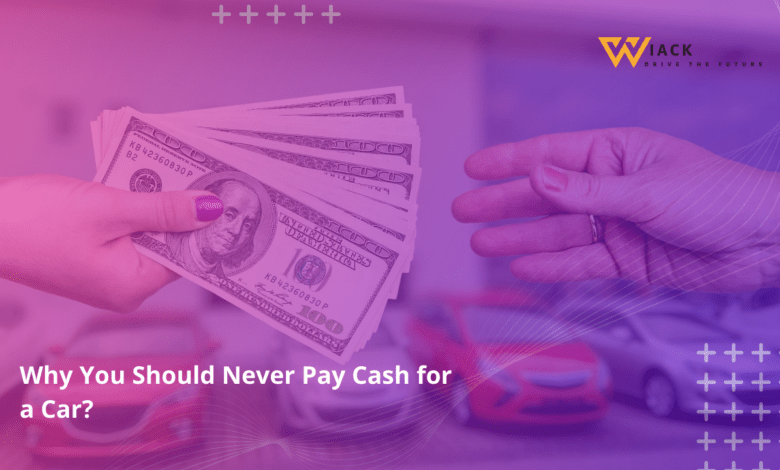Why You Should Never Pay Cash for a Car?

Did you know that paying cash for a car could actually cost you more in the long run? While it may seem counterintuitive, paying cash for a car often comes with hidden costs and missed opportunities that can significantly impact your financial health. In fact, studies show that financing a car purchase can save you thousands of dollars over time when compared to paying cash upfront. This surprising fact challenges the conventional wisdom that cash is always king when it comes to major purchases.
In this comprehensive guide, we’ll explore the reasons why you should never pay cash for a car and how making informed financing decisions can benefit your overall financial well-being. We’ll delve into the hidden costs of cash payments, the long-term benefits of financing, and strategies to make the most of your car-buying experience.
The Hidden Costs of Cash
When you’re considering paying cash for a car, it’s easy to focus solely on the sticker price. However, there are several hidden costs and missed opportunities that come with this approach. Let’s explore these often-overlooked factors that can make cash purchases less advantageous than they appear on the surface.
Missed Opportunities for Incentives
One of the most significant hidden costs of paying cash for a car is the potential loss of valuable incentives and rebates. Car manufacturers and dealerships frequently offer special financing deals, cash-back offers, and other incentives to encourage buyers to finance their purchases. These incentives can add up to substantial savings that cash buyers miss out on.
For example, a dealership might offer a $2,000 cash-back incentive for financing a new car. If you choose to pay cash, you’re essentially leaving that $2,000 on the table. Over the life of the vehicle, this missed opportunity could easily outweigh any interest you might have paid on a low-rate car loan.
Additionally, many manufacturers offer promotional low-interest or even 0% APR financing options for qualified buyers. These deals can result in significant savings compared to paying cash, especially when you consider the opportunity cost of using your cash for other investments.
Here’s a quick comparison of potential savings:
| Purchase Method | Purchase Price | Incentives | Total Cost |
|---|---|---|---|
| Cash | $30,000 | $0 | $30,000 |
| Financing | $30,000 | $2,000 | $28,000 |
As you can see, even before considering other factors, financing with incentives can lead to immediate savings.
Higher Sticker Prices
Contrary to popular belief, paying cash for a car doesn’t always guarantee you the best price. In fact, dealerships often prefer customers who finance because it allows them to earn additional profit through financing arrangements. As a result, they may be less inclined to offer their best price to cash buyers.
When you finance a car, the dealership has more flexibility in structuring the deal. They might be willing to lower the purchase price knowing they can make up the difference in finance charges or by selling additional products like extended warranties. Cash buyers, on the other hand, may face less negotiating room on the sticker price.
Consider this scenario:
- Cash Buyer: Offered a car for $30,000 with no room for negotiation.
- Financing Buyer: Offered the same car for $29,000 with a low-interest financing option.
In this case, the financing buyer starts with a $1,000 advantage, which could grow even larger when factoring in potential incentives and rebates.
Reduced Negotiating Power
When you walk into a dealership declaring your intention to pay cash for a car, you might think you’re holding all the cards. However, this approach can actually reduce your negotiating power in several ways:
- Limited flexibility: Cash payments are all-or-nothing propositions. With financing, you have more room to negotiate terms like the down payment, monthly payments, and loan duration.
- Fewer bargaining chips: Dealerships make money on financing and additional products. By taking those off the table immediately, you leave yourself with fewer areas to negotiate.
- Revealed budget: Stating you’re a cash buyer immediately reveals your budget to the salesperson, potentially limiting your ability to negotiate for a better price.
- Missing out on dealer incentives: Dealerships often have quotas or incentives tied to financing deals. By opting out of financing, you may miss out on special offers that could have lowered your overall cost.
To maximize your negotiating power, consider keeping your payment method open until you’ve agreed on a price. This approach allows you to explore all available options and potentially secure a better deal.
Financial Implications
While paying cash for a car might seem like a financially savvy move, it can have significant implications for your overall financial health. Let’s examine how this decision can impact your savings, investment opportunities, and purchasing power.
Depleting Savings
One of the most immediate consequences of paying cash for a car is the substantial drain on your savings. For many people, a car purchase represents one of the largest single expenses they’ll make, second only to buying a home. Using a large portion of your savings for this purchase can leave you financially vulnerable in several ways:
- Reduced emergency fund: Financial experts recommend keeping 3-6 months of living expenses in an easily accessible emergency fund. Using this money to buy a car could leave you unprepared for unexpected costs or job loss.
- Limited liquidity: Once you’ve spent your cash on a car, that money is tied up in a depreciating asset. If you need funds for other purposes, you may find yourself in a tight spot.
- Opportunity cost: The money used to buy a car outright could have been earning interest in a high-yield savings account or other investment vehicles.
Consider this example:
Let’s say you have $30,000 in savings and use it all to buy a car. Six months later, you face an unexpected home repair costing $5,000. Without adequate savings, you might be forced to use high-interest credit cards or take out a personal loan to cover the expense, potentially costing you more in the long run than if you had financed the car and kept your savings intact.
Limiting Investment Opportunities
When you pay cash for a car, you’re not just spending money; you’re also giving up the potential returns that money could have earned if invested elsewhere. This concept, known as opportunity cost, is a crucial factor to consider in any major financial decision.
Let’s break down the potential impact:
- Stock market investments: Historically, the stock market has provided average annual returns of around 7% after adjusting for inflation. By tying up your money in a car, you miss out on these potential gains.
- Retirement accounts: If you’re not maxing out your 401(k) or IRA contributions, using cash for a car purchase means missing out on tax advantages and potential employer matches.
- Real estate: In many markets, real estate has been a strong long-term investment. The cash used for a car could have been a down payment on an investment property.
Here’s a hypothetical scenario to illustrate the potential opportunity cost:
| Action | Initial Investment | Value After 5 Years (7% Annual Return) |
|---|---|---|
| Pay Cash for Car | $30,000 | $30,000 (minus depreciation) |
| Invest in Stock Market | $30,000 | $42,071 |
In this example, by choosing to invest rather than pay cash, you could potentially gain over $12,000 in five years, not accounting for the car’s depreciation.
Forcing Yourself to Buy a Car You Can’t Afford
One often overlooked risk of paying cash for a car is the temptation to stretch your budget beyond what you can comfortably afford. When financing a car, your budget is naturally limited by what you can manage in monthly payments. However, when paying cash, it’s easier to justify spending more than you should, thinking, “Well, at least I’m not taking on debt.”
This mindset can lead to several problems:
- Overspending: You might deplete your savings more than is financially prudent, leaving yourself vulnerable to other expenses.
- Lifestyle inflation: Buying a more expensive car than you need can lead to increased costs in other areas, such as higher insurance premiums and maintenance costs.
- Future financial strain: If you spend too much on a car now, you might struggle to meet other financial goals in the future, such as saving for a home or retirement.
To avoid this pitfall, it’s crucial to set a realistic budget based on your overall financial situation, not just the cash you have available. Consider factors like your income, other expenses, and long-term financial goals when determining how much you can afford to spend on a car, regardless of whether you’re paying cash or financing.
Long-Term Benefits of Financing
While paying cash for a car might seem like the most straightforward option, financing your purchase can offer several long-term benefits that extend beyond the immediate transaction. Let’s explore how choosing to finance can positively impact your financial future.
Building Credit History
One of the most significant advantages of financing a car purchase is the opportunity to build or improve your credit history. Your credit score plays a crucial role in many aspects of your financial life, from securing favorable interest rates on future loans to renting an apartment or even landing certain jobs.
Here’s how financing a car can boost your credit:
- Payment history: Making regular, on-time car payments demonstrates financial responsibility and can significantly improve your credit score over time.
- Credit mix: Adding an installment loan (like a car loan) to your credit profile can improve your credit mix, which accounts for about 10% of your FICO score.
- Length of credit history: As you continue to make payments on your car loan, you’re extending the length of your credit history, which can positively impact your score.
- Credit utilization: Unlike maxing out a credit card, an auto loan doesn’t negatively impact your credit utilization ratio, which is a key factor in credit scoring.
Consider this example:
Sarah, a recent college graduate, finances her first car with a 60-month loan. By making all her payments on time, she sees her credit score increase from 680 to 750 over the course of the loan. This improvement in her credit score helps her qualify for a better mortgage rate when she buys her first home two years after paying off her car loan, potentially saving her thousands of dollars over the life of her mortgage.
Access to Lower Interest Rates
While it might seem counterintuitive, financing a car purchase can actually lead to lower interest rates on future loans. This is because successfully managing a car loan improves your credit score, which in turn can qualify you for better rates on future borrowing.
Here’s how this can play out:
- Improved credit score: As mentioned earlier, making timely payments on your car loan can significantly boost your credit score.
- Demonstrated reliability: A history of successful loan repayment shows lenders that you’re a responsible borrower.
- Increased borrowing power: With a stronger credit profile, you may qualify for higher loan amounts and better terms in the future.
Let’s look at a hypothetical scenario:
| Loan Type | Interest Rate with 650 Credit Score | Interest Rate with 750 Credit Score |
|---|---|---|
| Car Loan | 6.5% | 3.5% |
| Mortgage | 4.5% | 3.25% |
| Personal Loan | 15% | 9% |
As you can see, the difference in interest rates can be substantial. Over the life of a large loan like a mortgage, even a small difference in interest rate can translate to tens of thousands of dollars in savings.
Flexibility for Future Purchases
When you pay cash for a car, you’re tying up a significant amount of money in a single, depreciating asset. This can limit your financial flexibility when it comes to future purchases or investments. Financing, on the other hand, allows you to keep more of your cash liquid, giving you the ability to take advantage of other opportunities as they arise.
Here are some ways financing provides flexibility:
- Preserved savings: By financing your car purchase, you keep more money in savings, which can be used for emergencies or other investments.
- Diversified investments: Instead of putting all your money into a car, you can invest in a diverse portfolio of stocks, bonds, or real estate.
- Business opportunities: Having cash on hand allows you to take advantage of business opportunities that may arise.
- Major life changes: Whether it’s starting a family, changing careers, or moving to a new city, having financial flexibility can make these transitions easier.
Consider this scenario:
John has $30,000 in savings. He’s considering buying a car and has two options:
- Pay cash for a $30,000 car
- Finance the car with a $5,000 down payment and invest the remaining $25,000
Six months later, John is offered the opportunity to buy into a promising startup for $20,000. If he had paid cash for his car, he wouldn’t have the funds available for this investment. By choosing to finance, he has the flexibility to take advantage of this new opportunity.
The Unexpected
Life is full of surprises, and your financial decisions should account for the unexpected. When considering whether to pay cash for a car, it’s crucial to think beyond the initial purchase and consider potential future costs and risks.
Maintenance and Repair Costs
One of the often-overlooked aspects of car ownership is the ongoing cost of maintenance and repairs. While paying cash for a car might give you a sense of financial freedom, it’s important to remember that your financial responsibility doesn’t end with the purchase.
Here’s why maintaining a cash reserve for car-related expenses is crucial:
- Regular maintenance: Even new cars require regular oil changes, tire rotations, and other routine services. These costs can add up quickly.
- Unexpected repairs: As cars age, the likelihood of needing major repairs increases. A blown transmission or failed engine can cost thousands of dollars to fix.
- Depreciation and upgrades: Cars depreciate over time, and you may need to invest in upgrades or replacements for various components to maintain the vehicle’s value and performance.
Let’s break down potential maintenance costs over a 5-year period:
| Maintenance Item | Average Annual Cost |
|---|---|
| Oil Changes | $120 |
| Tire Rotation/Replacement | $150 |
| Brake Service | $300 |
| Major Service (every 30,000 miles) | $500 |
| Unexpected Repairs | $500 |
| Total Annual Cost | $1,570 |
Over five years, these maintenance costs could total $7,850 or more. If you’ve depleted your savings to pay cash for a car, you might struggle to cover these ongoing expenses.
Unexpected Expenses
Life has a way of throwing financial curveballs when we least expect them. When you tie up a large portion of your savings in a car purchase, you may find yourself ill-prepared to handle unexpected expenses in other areas of your life.
Consider these potential scenarios:
- Medical emergencies: An unexpected illness or injury could result in significant out-of-pocket expenses, even with health insurance.
- Home repairs: Major home repairs, such as a new roof or HVAC system, can cost thousands of dollars.
- Job loss: Having a cash reserve can help you weather periods of unemployment or reduced income.
- Family emergencies: You might need to travel unexpectedly or help a family member in financial distress.
Here’s a hypothetical situation to illustrate the importance of maintaining a cash reserve:
Sarah pays $25,000 cash for a car, leaving her with $5,000 in savings. Two months later, her roof starts leaking and needs a $7,000 repair. Because she depleted her savings on the car, Sarah is forced to put the repair on a high-interest credit card, potentially costing her hundreds of dollars in interest.
By financing the car instead, Sarah could have maintained a healthier savings balance, allowing her to handle unexpected expenses without resorting to expensive credit card debt.
The Risk of a Total Loss
When you pay cash for a car, you’re assuming all the risk associated with owning that vehicle. One often overlooked risk is the possibility of a total loss – a situation where your car is damaged beyond repair or stolen and not recovered.
Here’s why this is particularly relevant when paying cash:
- Depreciation: Cars depreciate rapidly, especially in the first few years. If your car is totaled, insurance may not cover the full amount you paid.
- Gap in coverage: There might be a significant gap between what your insurance pays out and what you need to replace the vehicle.
- Financial strain: Without the car and potentially without adequate funds to replace it, you might face difficulties in your daily life and work.
Let’s look at a scenario:
John pays $30,000 cash for a new car. After two years, the car is worth $22,000 due to depreciation. Unfortunately, John’s car is totaled in an accident. His insurance policy pays out the current market value of $22,000. John is now left with $8,000 less than he paid, and he needs to find a way to make up the difference to replace his vehicle.
If John had financed the car instead:
- He would still have most of his original $30,000 in savings or investments.
- He might have been able to purchase gap insurance, which would cover the difference between the insurance payout and the remaining loan balance.
- He would have more financial flexibility to handle the situation and replace his vehicle.
This scenario illustrates how financing can provide a buffer against the risk of total loss, allowing you to maintain financial stability even in worst-case scenarios.
Conclusion
As we’ve explored throughout this article, there are numerous compelling reasons why you should never pay cash for a car. While the idea of owning a vehicle outright might seem appealing, the hidden costs, missed opportunities, and potential risks often outweigh the perceived benefits of a cash purchase.
Embrace the Power of Financing
Financing a car purchase, when done responsibly, can offer several advantages:
- Preserve your savings: By keeping more cash on hand, you’re better prepared for unexpected expenses and opportunities.
- Take advantage of incentives: Manufacturer and dealer incentives for financing can lead to significant savings.
- Build your credit: Regular, on-time payments can improve your credit score, leading to better financial opportunities in the future.
- Maintain financial flexibility: Financing allows you to invest your money in potentially higher-yielding opportunities.
- Manage risk: By not tying up all your funds in a depreciating asset, you’re better positioned to handle unforeseen circumstances.
Make Informed Decisions
When it comes to car buying, it’s crucial to look beyond the sticker price and consider the long-term financial implications of your decision. Here are some key points to remember:
- Do your research: Understand the true cost of ownership, including maintenance, insurance, and potential depreciation.
- Shop around for financing: Don’t just accept the first offer. Compare rates from banks, credit unions, and dealerships to find the best terms.
- Consider the opportunity cost: Think about what else you could do with the money you’d spend on a cash purchase.
- Read the fine print: If you do finance, make sure you understand all the terms of the loan agreement.
- Plan for the unexpected: Maintain an emergency fund to cover unexpected car-related expenses or other financial surprises.
Prioritize Your Financial Health
Ultimately, the decision of how to purchase a car should be made in the context of your overall financial health. Here are some final thoughts to consider:
- Balance short-term and long-term goals: While owning a car outright might feel good in the short term, financing could better serve your long-term financial objectives.
- Consider your entire financial picture: Your car purchase should fit into your broader financial plan, including savings, investments, and other financial goals.
- Be realistic about your needs: Don’t overspend on a car, whether you’re paying cash or financing. Choose a vehicle that meets your needs without straining your budget.
- Stay flexible: Financial circumstances can change. Financing gives you more flexibility to adapt to life’s changes without compromising your financial stability.
- Seek professional advice: If you’re unsure about the best approach for your situation, consider consulting with a financial advisor.
In conclusion, while paying cash for a car might seem like a smart financial move on the surface, a closer examination reveals that financing often provides more benefits and flexibility. By carefully considering your options and making an informed decision, you can ensure that your car purchase supports your overall financial well-being rather than potentially compromising it.
Remember, the goal isn’t just to own a car—it’s to own a car in a way that enhances your financial health and supports your long-term financial objectives. By understanding the pros and cons of different purchasing methods and aligning your decision with your broader financial goals, you can make a choice that serves you well both now and in the future.
Get the latest car news, reviews, and prices at Wiack.com. Your one-stop destination for all things automotive.





